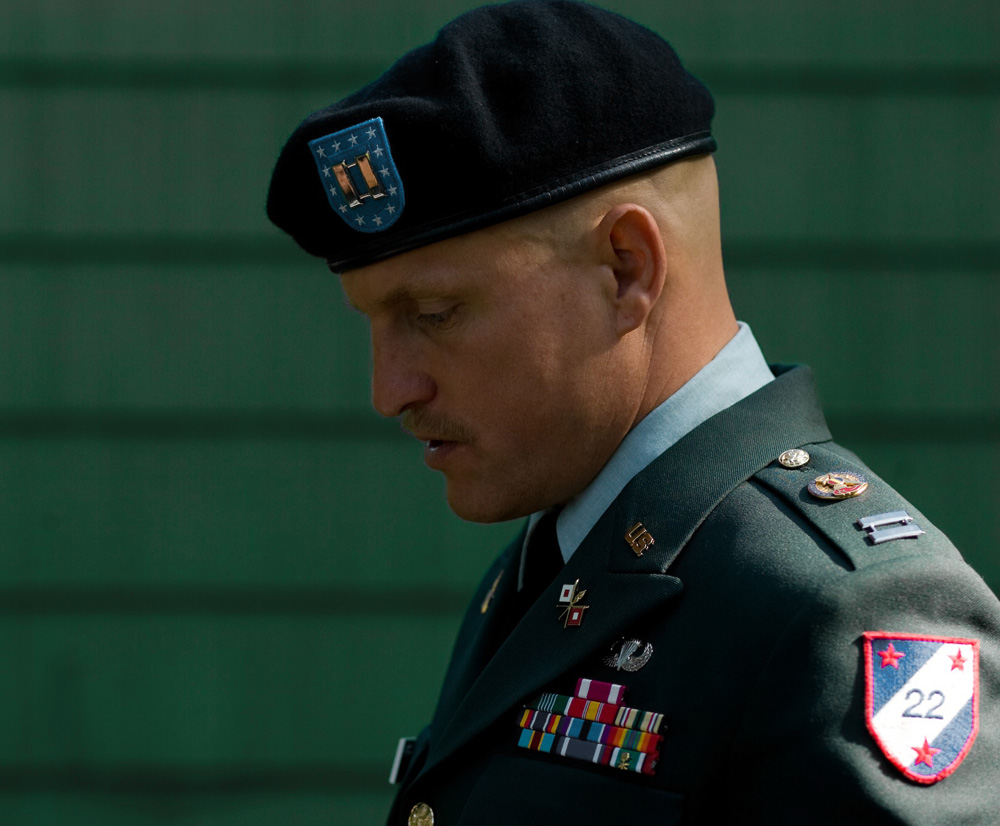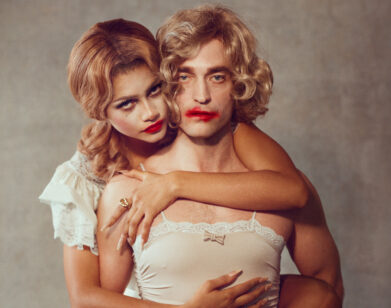Woody Harrelson

Woody Harrelson could so easily have remained the adorable goof behind America’s favorite bar forever. It’s hard to believe now, but for a while playing Woody Boyd on the sitcom Cheers seemed like the summit of Harrelson’s career. (Is there a quicker way for an actor to become typecast than to share a name with a character?) But the Texas-born yearling made quick work of landing choice film roles in Hollywood after the iconic Boston bar shut down operations in 1993. Harrelson went from starring in one of the most violent, experimental, and relentlessly criticized films of the 1990s (Oliver Stone’s Natural Born Killers, 1994) to starring in one of the most violent, experimental, and universally praised films of the 2000s (the Coen brothers’ No Country for Old Men, 2007), with an Oscar-nominated turn as Hustler magazine publisher Larry Flynt (in Milos Forman’s The People vs. Larry Flynt, 1996) in between. The 48-year-old Harrelson has had an unpredictable, brilliantly bipolar career that no one—let alone the actor himself—could have anticipated. A handful of his roles in new films are equally disparate: Harrelson plays a gratuitous, slapstick zombie-slayer in the satirical walking-dead comedy Zombieland; a loose-cannon doomsday prophet in the upcoming disaster epic 2012; and a casualty notification officer in the somber military drama The Messenger. It’s this last film, though, that Harrelson seems to have particularly treated as a labor of love. He talks to his friend and gambling partner Owen Wilson about The Messenger, as well as speeding, losing at poker, jumping out at roommates, and a number of other eccentricities he’s managed to pick up over the years.
OWEN WILSON: Hey, buddy.
WOODY HARRELSON: Hey.
WILSON: Where are you?
HARRELSON: I’m in the beloved state of Hawaii. Maui.
WILSON: Where?
HARRELSON: I’m at your house. [laughs] No, I’m up in my house.
WILSON: Sounds like you’ve had a good run of poker there. Last you said, you won three games in a row?
HARRELSON: Yeah, three times in a row. That never happens. But I’m also managing to pull the chute a little earlier and get the hell out before I give it all back and start writing chits.
WILSON: That’s always been the scouting report on you in poker: Not a lot of discipline. So I’m glad to see that you’re learning how to walk away.
HARRELSON: Yeah, I’ve got to look at your scouting report sometime.
WILSON: We’re probably the two worst players in that Maui poker game.
HARRELSON: It’s not that. We’re just the most trusting.
WILSON: We’re the most optimistic, the most hopeful.
HARRELSON: We believe in our own luck.
WILSON: It’s such a cast of characters that play in that Maui poker game. I remember our one friend saying it looked like the bar scene from Star Wars.
HARRELSON: Those guys are scoundrels, man. They sit there and pick you clean.
WILSON: I’m out in Malibu right now, and I was just thinking that you lived out here when you worked on Cheers, didn’t you?
HARRELSON: Yeah, I was out there until I was about 33.
WILSON: That seems like a long commute from here to Paramount Studios on Melrose.
HARRELSON: I never broke the 25-minute barrier, but I could always make it in under a half hour.
WILSON: Which is insane.
HARRELSON: Well, I had my motorcycle. I took the PCH [Pacific Coast Highway] to [Highway] 10 to Crenshaw [Boulevard], just trying to fight the traffic.
WILSON: Wow, that’s flying. When did you first come to L.A.?
HARRELSON: I came in around ’85.
Photo credit: Woody Harrelson in The Messenger. Photo: Niko Tavernise.
I was on Cheers for eight years, and I couldn’t get another job, and I thought, I’m going to be Woody Boyd forever. Which is not bad, but I really thought I was capable of more.”Woody Harrelson
WILSON: I remember you saying that you had already landed the role on Cheers and that you were rooming with Clem [Franek] and the Farrellys. I also remember you saying that when you first did interviews for Cheers and people asked you who the funniest guys you knew were, you’d say these guys from Rhode Island, the Farrelly brothers . . .
HARRELSON: I was always saying that. Who knew that they’d become these comedy phenoms?
WILSON: I remember Pete Farrelly saying that you guys would do things to try to scare each other.
HARRELSON: Yeah, I’d sometimes hide in his bathroom. . . I might wait an hour or so for him.
WILSON: Pete said that he’d come home and fix himself something to eat, go into his bedroom, start watching TV or reading. Then after an hour or two, he’d finally go into the bathroom to get ready to go to bed, brushing his teeth in the mirror, and suddenly you’d appear from the shower. [both laugh] This means you’d been waiting for two hours. That’s a real commitment to a joke.
HARRELSON: Yeah, it’s a little twisted. He finally put a stop to it. And one time he slapped me because he got so freaked out. He started screaming, “Never do that again! I could have a heart attack!” So that ended the fun of that one.
WILSON: When did you first get interested in acting?
HARRELSON: High school. I heard that if you were a terrific athlete, you could attract girls. So I had to look into some other possibilities. [laughs] I got into theater actually because of this girl, Robin Rogers. After she saw me do an Elvis impersonation in the library, she said I should be in the theater. And I was like, “If Robin Rogers wants me to be in theater, I’m going to be in theater.”
WILSON: You did a good Elvis impersonation?
HARRELSON: [In Elvis voice] Well, I, uh, uh, don’t want to brag, but, uh, uh, I surely did.
WILSON: Obviously you made the transition from doing theater to meet girls to something that you found you were good at.
HARRELSON: It really was specifically so I could hang out with Robin. I started dating her up until my freshman year in college. She came to visit me at college and got really upset because I had a paper that I hadn’t even started and she didn’t want to watch me peck away at my typewriter. She got furious, and our relationship ended. But, yeah, I found out I really liked acting.
WILSON: When did you decide to try to make acting your job?
HARRELSON: Well, I think it was because my buddy Clint Allen, who went to Hanover College with me, said that he was going to try out for Juilliard. And if he got accepted, he asked if I’d move to New York and be his roommate. I said, “Well, sure!” thinking the odds were astronomical that he’d get accepted. But he did. So I went. I was planning to bounce around and do regional theater and summer stock and eventually make my way to New York. But it happened faster that way.
WILSON: I’ve never done any theater acting. What did you like so much about it?
HARRELSON: We’re never going to be rock stars, which is probably everybody’s real dream. So that’s our only chance to get up in front of a live audience.
WILSON: Do people still send you plays or do you look for them?
HARRELSON: Well, mostly it’s been people sending things. But lately I’ve been looking for something to do that’s really cool. Dustin Hoffman said he would love to do a play with me, so I’ve been trying to think of one. Frances McDormand also wanted to do one. They both said this to me casually. But I take it very seriously, so I’ve been looking around. The thought of doing something they could all be in—and maybe Ben Foster as well. That would be pretty cool.
WILSON: You and Ben worked on The Messenger together. It was some of the best work I’ve seen in a long time.
HARRELSON: Thanks, man. This fellow named Oren Moverman co-wrote the script. He’s a fantastic writer and director. When I first read the script, they wanted me to do a small part, and I really didn’t want to, although it was one of the greatest scripts I had read. They wanted me to play the colonel, which was more of a cameo thing. But when I said I couldn’t do it, they said, “What about this other part, Captain Tony Stone.” And I was like, “Ah, yes. I think that one is a fantastic part.”
WILSON: Did you do any research?
HARRELSON: Well, you might remember I was picking your brain, finding out all about your military service. And I got to go meet a lot of soldiers, a lot of people in the Army, which was a great experience for me because I’m not a big lover of these wars we have going on here, which I would consider oil wars. So it was nice to spend some time with the soldiers and realize their part in all this and how truly heroic they are, doing what they’re doing—all this for no money and just for the love of their country and fellow man, really putting their lives on the line. So I really became a fan of the warrior but not the war.
WILSON: Did you speak with anyone who actually had your job? The “messenger” refers to the characters that you and Ben Foster play, who are military officials who give news to the next of kin about a death.
HARRELSON: Casualty notification officers. Yeah, I talked to a few of those guys, and they say it’s the hardest job in the Army. You can imagine it would be pretty tough to have to go and tell people that news. There’s not really that much they can say. It’s incredibly difficult, so painful. What’s cool, though, is that the Army really got behind the film and supported it and let us shoot on the Fort Dix military base. They wanted people to recognize this part of the program. But I don’t want anyone to think this movie is a bummer. It is really quite uplifting. Oren Moverman is an amazing director. He did so many extraordinary things—like letting a scene go for nine minutes long. Your buddy Ben Stiller saw the movie and had lunch with him the next day. He wants to work with him.
WILSON: After the stories you heard from the Army, did you do any improvising?
HARRELSON: The script was pretty polished by the time I read it, but we did do a lot of improvising and we did throw in things, sometimes just spontaneously. Like in one scene I sing an army song . . . .
WILSON: I remember when you were working on No Country for Old Men. I guess you were doing a scene with Javier [Bardem], and you guys just started talking. It was that incredible last scene you were in with all of that tension. I remember you saying that you guys brainstormed dialogue together, and you came up with some ideas and wrote out a couple of pages. And you guys were excited and showed them to the Coens, and they said, “Yeah, this could be good.” But then you ended up doing it the way they had it. [both laugh]
HARRELSON: I actually saw so much good material in Cormac McCarthy’s book. There was cool stuff like “You keep looking at my eyes like you think if you keep looking at my eyes I won’t shoot you.” So I actually rewrote the scene, and Javier and I got together in the evening and memorized it, and then we went in the next day and performed it for those guys, and they were like, “Yeah, you know what? Let’s keep it the way it was.” [laughs] I think they did change one line, which for them is unusual, being such maestros, and I was being presumptuous. But I’m one of those actors who is going to come in with 2,500 ideas. You can shoot down 2,499, but one of them you’re going to like.
WILSON: Your body of work has been amazing. There aren’t many actors who have done so many different things. I mean, to go from Cheers, where the character had your name, and break out of that and then go from Natural Born Killers to The People vs. Larry Flynt and then Kingpin [1996], which you did with the Farrellys—that’s real range.
HARRELSON: You know, I was on Cheers for eight years, and I couldn’t get another job, and I thought, I’m going to be Woody Boyd forever. Which is not bad, but I really thought I was capable of more.
WILSON: What do you think was your real break into movies?
HARRELSON: It was really White Men Can’t Jump [1992]. I guess I probably would’ve just been Woody Boyd but for the fact that Keanu Reeves didn’t play great basketball. [Wilson laughs] That was the only thing that saved me.
WILSON: How did you get cast in Natural Born Killers?
HARRELSON: Well, we thought it was kind of weird because when I was cast in Natural Born Killers, the only things Oliver Stone could have seen me in were Cheers and White Men Can’t Jump. Even Indecent Proposal [1993] hadn’t come out. So it was weird that he cast me, but he just said, “I see something in your eyes.” I was glad to work with Oliver because I always thought he was one of the great cinematic geniuses—I still do. And I was really glad to get to do that part, although, ironically, when the movie came out, I thought the big problem would be that people wouldn’t believe my character. But the big fallout actually came from the violence in the movie.
WILSON: That film got a lot of criticism.
HARRELSON: The media rained down negativity on it. At the time, I really thought that was unfair because I saw it as a misunderstood romantic comedy. But if you’ve got to explain that something’s a satire, then I guess it don’t really work. [laughs]
WILSON: I was going to say that I can only think that Oliver Stone must’ve seen something in your eyes that I’ve seen a few times, like when I’m trying to collect from you on a bet that you’ve lost. You do have a kind of crazy gear that you can click into.
HARRELSON: Yeah, you’ll be seeing that in a couple days, don’t worry.
WILSON: Which one of us would you say is the better sport when he loses?
HARRELSON: I think I’m probably a better sport. You tend to really just freak when you lose. You have a real hard time with it.
WILSON: But I think that’s because we’ve always been good friends and love the competition. It’s the same with my brothers. We can just sit there for eight hours throwing pebbles at a tree to see who can hit it the most times and be endlessly entertained by that. You grew up with brothers too. There’s something funny about growing up with a lot of male energy—and now you’re surrounded by four goddesses in this beautiful family that you have.
HARRELSON: It’s the way I like it now. I can’t imagine anything different.
WILSON: Having three daughters must be a change of pace from being around a bunch of guys.
HARRELSON: I don’t know—they’re pretty competitive. [laughs] Well, dude, I know you must have little stand-up paddling in your immediate future.
WILSON: Whoa! Don’t be rushing me off the phone here! I’ve got a page of 47 questions and we’ve covered three of them! We’ve got to keep going. Really, I can do this all day. [laughs] But I was actually having flashbacks to before we were even friends, when I set up a lunch with [film producer] Richard Sakai to pitch you on a script idea or something. I remember, after about, like, five minutes, I just kind of stopped talking, like, I kind of gave up on my idea. You say that you still remember it being one of the worst pitches you ever heard. [laughs]
HARRELSON: It was so funny because you wouldn’t even commit to finishing a sentence. It was like, “Well, I was just thinking, you know . . . Maybe . . . You know?”
WILSON: It was definitely the soft-felt approach. I don’t even remember what the idea was that we were pitching you, but I was not P.T. Barnum exactly. [both laugh] All right, buddy. I look forward to seeing you down the road in Maui.
HARRELSON: I’ll see you then, bro. Take care.
WILSON: You bet.
Owen Wilson is an actor and an Academy Award–nominated screenwriter.






